#he’s just…youth personified
Explore tagged Tumblr posts
Text
Depressingly realized that I am going to be five or six years older than ryuji this year
#what happened….#😭😭😭#it’s a different sort of heartbreak to grow old but your favorite stays the same age#idk it’s a different feeling when it comes to ryuji#he’s just…youth personified#and that was something I really related to#but now I’m so old!#but I still relate to him#that’s how you know he’s such a good and character#I love you ryuji!#I can only try hard now because you gave me the platform to get to where I am today#it’s his birthday next month! I should do something to celebrate#mine
3 notes
·
View notes
Text
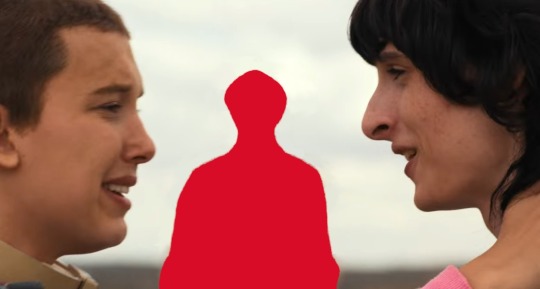
I've described myself in the past as "overly-queerbaited" as a way of explaining why it took me so long to come around to Byler endgame as a legitimate possibility... but that's kind of a misleading way of putting it.
Truth is, I've always been too much of a cynical fuck to fall for queerbait... or any other story that promises positive queer rep.
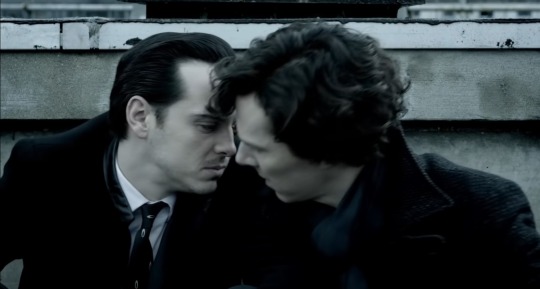
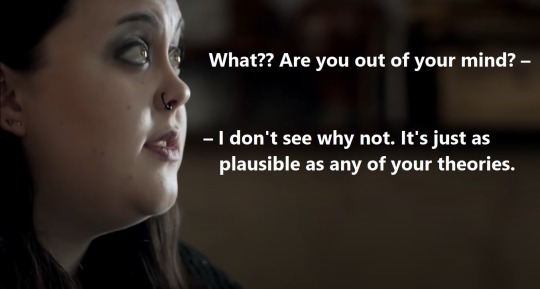
[Sherlock couldn't touch me; I saw this cringe homophobia coming from a mile away. Fans mistaking straight anxiety jokes for meaningful gay subtext was clearly doomed to end in mockery. Nobody deserved to be treated like that... but god, it was easy to predict.]
I think it's a symptom of having grown up under Section 28 -- feeling like I'm being unreasonable for wanting to see queerness normalized is such an ingrained habit that even today I instinctively recoil like a vampire touching sunlight whenever an optimistic queer story falls unrequested into my lap.
But I'm hardly alone in feeling this way -- many queer Millennial and Gen-X fans of Stranger Things are against the idea of Byler because it would ruin the catharsis of watching the gay boy growing up in the same era as we did slowly succumb to the same despair that we did.
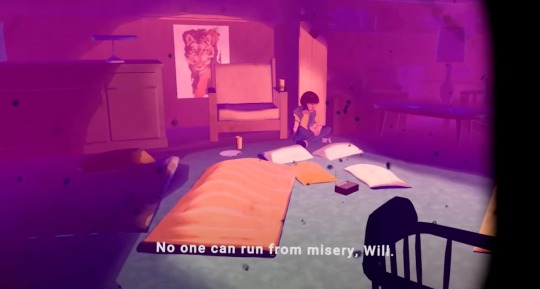
[For those who haven't played the VR game: Vecna is speaking in this screenshot.]
There's genuine comfort to be found in painful stories -- this type of catharsis is practically the cornerstone of horror as a genre -- so I can't really fault myself or anyone else for wanting it, despite the obnoxious oversaturation of disappointing queer endings in media.
This is the nostalgia show, after all -- and like it or not, for many middle-aged queers in the target audience, nostalgia is shot through with the pain of homophobia and loneliness.
But do you know who else is a hurt queer(-coded) adult who resents happy endings? This cynical fuck:
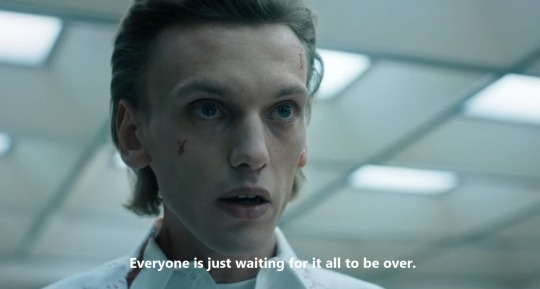
Henry personifies despair and loneliness and the dark urge to take our pain out on others -- and when Will is in the picture, I would argue that he also represents internalized homophobia.
Will might represent who we were -- but Henry represents who we've let ourselves turn into.
And I don't think many of us want to admit to that, because that would involve questioning why we have so much in common with the literal villain of the show; why we're still so consumed with self-pity after 20+ years that we're obsessing over the fate of some kid.
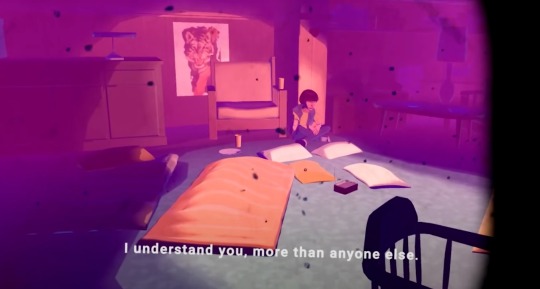
I'm not suggesting that wanting a less-than-fairytale ending for a fictional gay boy is equivalent to being a child killer lol. It's perfectly valid to want to see your pain acknowledged, and stories which appeal to that desire deserve to exist.
But between Henry's connection to Will and the cycle of abuse themes of the show, it's clear that this particular story simply isn't about wallowing in the bleakness of growing up gay in the 80s, but about self-actualizing in spite of it all.
So I just can't bring myself to want a "relatable" ending for Will.
As much as I struggle to enjoy positive queer rep, I don't want to be so cynical. I'd thrown up so many walls to protect myself as a teenager that I forgot how desperately I wanted to see just one of those painful queer stories end on the same uplifting note that straight stories were always entitled to: with true love overcoming the odds, saving the day, and living happily ever after.
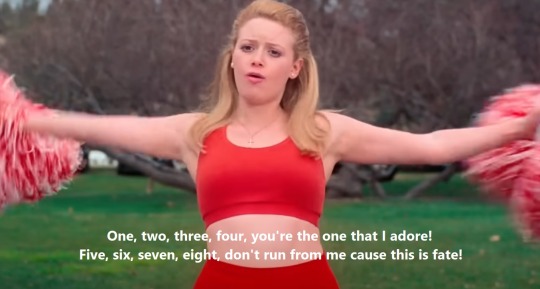
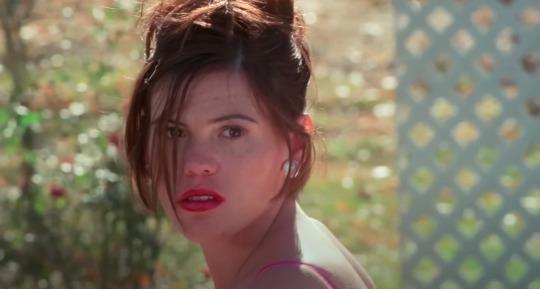
[But I'm A Cheerleader, a surprisingly fun movie about conversion therapy, is proof that stories like this did exist when I was a teen... but finding them in the pre- and early-internet days amidst so much censorship was a tall order.]
What makes Stranger Things different from most queer stories -- and what allowed it to pierce through my defenses and stab me in the gut -- is that it perfectly mimics those bleak, acceptable-to-the-censors stories from my youth -- only this time, the secret uplifting gay plot twist is real.
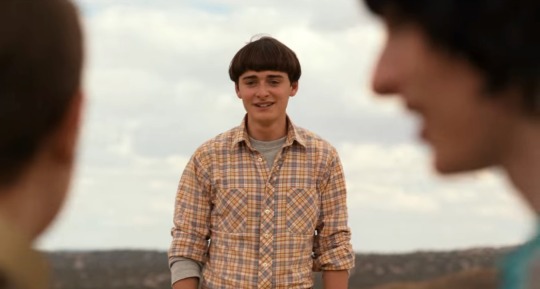
Not for the sake of shock value or of grabbing some empty woke points at the last second, but because the plan all along was to slap the audience in the face for believing homophobic lies about the existence of queer happiness.
That's some gourmet catharsis, if you ask me.
Just the possibility that my inner child might finally be vindicated has allowed me to truly let myself want the things I want for the first time in 20 years -- and that's the first step towards finally crawling back out into the sunlight.
Happy Pride Month, everyone. 🌈
327 notes
·
View notes
Text
filled prompts for @codywansleepbingo :D we got: spooning, deep sleeper, insomnia! nothing particularly to warn for, though this is set sometime in the HEA phase of I Got My Head Checked, the Sithywan AU. Rest of the ficlet and bingo card under the cut!
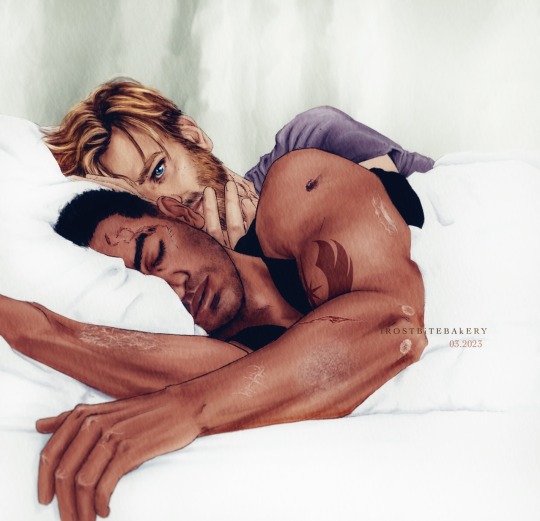
Soft Sick Underbelly
“Major or long-lasting stress can lead to chronic insomnia.”
“Tell me something I don’t know,” Obi-Wan mutters to himself.
It has been… a while since sleep turned away from him in such a snit. He’s not unfamiliar with insomnia. For a long time he had been too afraid to sleep, catching naps here and there during his training—
“Abuse,” Cody would correct him.
His unconventional youth.
Sleep was for doomed prey until he was shaped enough into a predator to grab the luxury and take advantage of it. To take and take until the sleep deprivation was a fond, silly memory of the weak.
To sleep soundly, arrogantly, next to an enemy until the blaster was pressed against his forehead like birdsong. Nothing to concern himself with because he was made to be just that good.
Cody, Obi-Wan mourns to think of their first morning, isn’t anything special in that regard. What made him special, and continues to do so, is that Obi-Wan came back into his arms to sleep, to rest, over and over.
With Cody, he could wake up slow and unafraid. How Cody manages the same is a mystery to Obi-Wan still, on some days. Possibly the insomnia talking him into the spiral of fear, hate…
He doesn’t bother to remember what came after hate in Qui-Gon’s little speech. Cody said it was something to do with toasters.
Cody isn’t naïve. Perhaps he’s still lacking a bit of life experience, down to the few years he’s existed and how, but he’s not going into situations without a plan. Admittedly, he had lost his sight for a tiny bit there when Obi-Wan slithered into his life like the snake he was. Nevermind that it all had backfired on Obi-Wan rather spectacularly, the blind spot for himself Obi-Wan had started to cultivate in Cody had turned out to be mutually beneficial.
Obi-Wan snorts to himself and goes back to reading treatments for insomnia in hopes the irony alone will put him to sleep.
The small data pad is balanced on Cody’s upper arm in front of him, angled away so no light shines into Cody’s face. Obi-Wan is nothing but courteous.
Cody is a deep sleeper, here. In their space, their home, with Obi-Wan. Endearing and humbling. Not naïve. Not even with his back, his neck, to Obi-Wan like a lamb.
It’s trust like a soldier shows. Endearing and humbling, indeed.
Obi-Wan desperately wants to hold his hand, suddenly. The urge rising in his chest. The back of his fingers brush over Cody in substitute, careful not to disturb.
Cody wakes up anyway.
Slow for a minute, then all at once with a jaw-breaking yawn. One of his hands flaps over and behind him, and Obi-Wan offers his own. Like Cody knows.
His hand is guided around Cody, cradled into his chest.
“Bad night?” Cody asks in a murmur.
Obi-Wan fits himself closer into Cody’s warmth, not exactly hiding from the world.
Sleepy eyes turn to him. “Still blue.”
He feels his eyes are blue but it’s a relief to have the confirmation. Sometimes he can’t tell the difference, insides feeling breakable and rotten.
Cody shuffles back into him, a barrier between Obi-Wan and everything else that is not in his head only.
The early morning sun shines on the windows, sneaks through the glass, and plays with Cody’s skin. It's mesmerizing. Charming, in its own way.
The tiredness, the pulling at his eyelids and thoughts, is sudden and unwelcome. It’s morning. They should get up. Routine is good for both of them, after everything. A bit of predictability to stabilize them. They still get up to too many fun adventures. They're somewhat the personified headache of the Jedi Order, especially after their vacation. But this is home. Home is where the masks fall.
Cody latches onto more of his arm, lays his cheek into Obi-Wan's palm. “I’m awake now. Do you want to sleep?”
“Keeping watch for me?” Obi-Wan teases and his wrist is kissed.
“If you want.”
He sighs into Cody’s neck. “If it’s not too much trouble.”
“Never.”
Obi-Wan closes his eyes. Inserts the details into himself, of Cody watching over him like Obi-Wan watches in return. The light behind his eyelids, no suffocating darkness. Cody's stubble scratching over callouses.
Sleep doesn't come immediately. It takes its time. But eventually it's there, welcomes him like Cody's warmth.
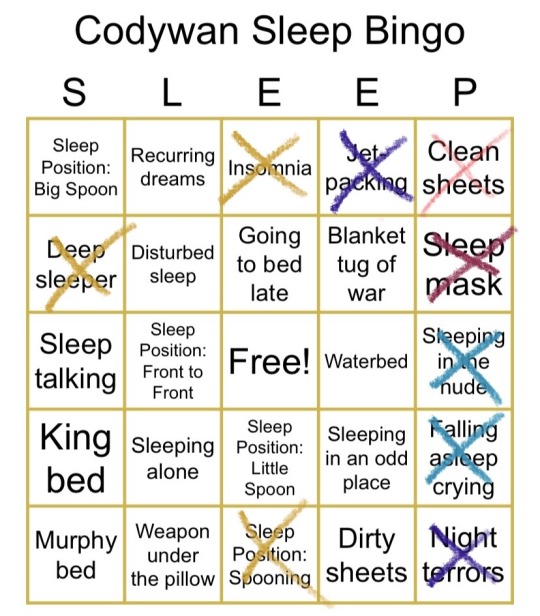
#codywan#commander cody#obi wan kenobi#sith!obi wan#sithywan cinematic universe in my head#my art#my fic#the clone wars fanart#the clone wars fanfiction#frostbitebakery art
1K notes
·
View notes
Text



Manjushri – Buddha of Wisdom Talon Abraxas
Mañjuśrī, the bodhisattva, personifying supreme wisdom. His name in Sanskrit means “gentle, or sweet, glory”; he is also known as Mãnjughoṣa (“Sweet Voice”) and Vāgīśvara (“Lord of Speech”). His name means “Gentle Glory” in Sanskrit, in Tibetan he is called Jamphel Yang. He represents Prajna Wisdom. Therefore, he often appears in classic Prajna.
Many legend stories often say he is the master of seven Buddhas and all the mothers of Buddha. It is said that Prajna Wisdom is the teacher and mother of all buddhas. The Lord Buddha once said Manjushri was his teacher in his past life.
Manjushri is often depicted holding a double edge flaming sword on his right hand and holding a lotus flower on which there is a scripture of Prajnaparamita sutra (Great Wisdom). He is either seen sitting on a lotus flower on a moon disc or riding a lion. The double edge sword is called Prajna Khadga (sword of wisdom). This sword represents the sharpness of wisdom that can cut the root of ignorance with its luminous rays emanating out of it. The scripture on the lotus flower symbolises wisdom as pure as a lotus. The lion symbolized the stern majesty of wisdom as it is the king of Animal. It also means Manjushri teaches Dharma without favour or fear.
He is an important presence in Mahayana sutra, especially the Prajnaparamita sutras (Perfection of Wisdom sutras, Lotus Sutra, Avatamsaka Sutra. He is attributed with bringing the insight that leads many sentient beings to Enlightenment and he is considered the Bodhisattva of Wisdom; in Vajrayana, he is a completely enlightened Buddha. (This is not a contradiction, but rather, a path: the Bodhisattva path leads to Buddha Enlightenment.)
He is also one of the three “great” Bodhisattvas, along with Avalokiteshvara and Vajrapani. Broadly speaking, they represent three critical concepts, or the three virtues of the Buddha:
Manjushri: wisdom and insight (prajna)
Avalokiteshvara: compassion and love (metta)
Vajrapani: power and strength and protection
His perfect Pure Land is Vimala, in the East, and he is associated with Vairochana (Tibetan, nangpar nangdze, English Buddha Resplendent.) His other names include Vakishvara (Lord of Speech.) As an emanation of Vairochana — who vowed to emanate throughout the universe as a youthful Bodhisattva of Wisdom — he represents the “beginnings” of wisdom and our own ability to achieve it.
Manjushri does not give us the answers; he grants us the process to find our own wisdom. The beginnings of wisdom, and that first all-important insight. He especially helps us see through the delusions of duality.
There are also specialized forms of Manjushri: Black, Orange, Four-armed Namsangiti, wrathful Yamantaka, and many others. For instance, as Namsangiti, he is yellow with one face and four hands and holds in the first right hand a blue sword of wisdom licked with flame, and in the left at his heart, he holds a pink utpala flower; then, the blossom at ear-level supports the Prajnaparamita sutra. In the lower two arms are a bow and arrow.
Jampal Tsanju is another emanation of Manjushri with one head and four hands holding a sword, the Prajnaparamita sutra and a bow and arrow. He is pink or white with one face and four hands. There is also a three-faced form.
Why is Manjushri always visualized as a beautiful youth of sixteen, in the prime or beginning of his manhood? This important symbol reminds us that Manjushri is the beginning of insight. Within his practice is also the ultimate completion of practice, as represented by the “Perfection of Wisdom” text in his hand. But,the youth symbolism is vital, since most suffering humans, even the most advanced among us, could be said to be just at the “beginning” of understanding and insight. He encourages us, with his smiling, gentle, face — the “gentle friend”, as he is called by many — and his simple symbolism.
Unlike other Buddhist deities, his symbolism is ultimately simple. Just as the Heart Sutra (part of the Prajnaparamita sutras‚ is short and simple — clear and concise “Form is emptiness; emptiness is form” — at the same time his elegant simplicity is also ultimate complexity and deep, profound wisdom. Just as Heart Sutra expresses the vastly profound in a few hundred words, Manjushri’s symbolism of sword, text and youth likewise deliver a concise, yet vastly profound message.
Manjushri Mantra:
"Om Ah Ra Pa Ca Na Dhih"
37 notes
·
View notes
Text
Chopin's Funeral
By Benita Eisler

Funeral at La Madeleine, 1868
On a sparkling Paris morning, Tuesday, October 30, 1849, crowds poured into the square in front of the Church of the Madeleine. The occasion was the funeral of Frédéric Chopin, and for it, the entire facade of the great neoclassical temple had been draped in swags of black velvet centred with a cartouche bearing the silver-embroidered initials FC.
Admission was by invitation only: Between three thousand and four thousand had received the black-bordered cards. Observing the square with its crush of carriages, the liveried grooms and sleek horses, the throngs converging on the porch, Hector Berlioz reported that "the whole of artistic and aristocratic Paris was there." But another who surveyed the crowd, the music critic for the Times of London, suspected that of the four thousand who filled the pews, a large number had been admitted just before noon, strangers to the dead man, mere bystanders even, "many of whom, perhaps, had never heard of him."


Facades of La Madeleine, 1840-70
If death is a mirror of life, Chopin's funeral reflected all the disjunctions of his brief existence. The most private of artists, his genius was mourned in a public event worthy of a head of state. Canonized as "angelic," a Shelleyan "poet of the keyboard," Chopin seemed to personify romanticism, and before he was buried, its myths had already embalmed him: a short and tragic life; an heroic role as Polish patriot and exile; doomed lover of the century's most notorious woman; and finally, his death from consumption, that killer of youth, beauty, genius, and of courtesans foolish enough to fall in love.

Chopin's Last Chords by Józef Męcina-Krzesz
In reality, he was the least romantic of artists. While the generation that had come of age just before his own in France, including the Olympian Victor Hugo, had defined romanticism as a holy war of the "moderns" (themselves) against the "ancients" (their literary elders), setting off riots in theaters to make their point, Chopin clung to the past. His musical touchstones were Haydn, Mozart-but especially Bach. He harbored doubts about Beethoven's lapses of taste, was incurious about the music of Schubert, and generally contemptuous of his other contemporaries: Schumann, Berlioz, and Liszt, towards whom his feelings were further tangled by rivalrous friendship. In art, he preferred the marmoreal neoclassicism of Ingres and his followers to the radical inventions in color and form of his friend Delacroix. Socially and politically, he was still more conservative.
The same aristocratic circles that had embraced Chopin the child prodigy in Warsaw were waiting to welcome the twenty-one-year-old sensation of Paris. Chopin arrived in France in 1831. One year before, revolution had replaced the Bourbon Restoration with the Orleanists swept in by Louis Philippe and his July monarchy. It was still a world of fixed hierarchies: of titles, birth, and breeding, buoyed by a flood tide of fresh money coined by the financiers and industrialists whose entertainments outshone the Sun King in splendor, if not in style. Chopin made some friends among the professional middle class-a less grand banker or diplomat, a few fellow musicians. He had a horror of "the People" as a force of upheaval or even change (which he dreaded in any form), and he was suspicious of those who championed their cause. He was appalled by that quintessentially romantic belief, whose most ardent proponent was George Sand, that art must serve the cause of social justice-or, indeed, any other cause except itself.
Like many who have thrived as "exceptions," propelled by talent from modest origins to a place among the privileged, Chopin was repelled by marginality: by poor Poles, by Jews, by the ill-dressed and ill-mannered, by coarseness or slovenliness, in art or life.

Chopin’s hand and death mask
Most likenesses of the composer suggest that he was far from handsome. He had pale, colorless hair, a thin, hooked nose, a pursey mouth, and rabbity, lashless eyes. In these images, Chopin bears only a glancing resemblance to his famous portrait by Delacroix-the portrait of romantic genius itself, with his tousled chestnut mane and burning inward gaze. Chopin's famous dandyism, then, must be understood as another labor of creation, like his music an imperious quest for perfection. The dandy enlists distinction-in dress, speech, manners-along with distance, to create a masterpiece: himself.
What appeared to many-then and now-as the snobbery of a provincial, self-invented aristocrat and aesthete, had deeper sources. Chopin needed the reassurance that a fixed social order provides. Dependent and childlike in many ways, he clung to the security of protective institutions-the monarchy, the Church, and the family-which defined themselves proudly as patriarchal, stern but loving fathers keeping watch over children, dedicated to exalting an ideal past and to keeping present chaos at bay.
Two years and only two public concerts after his arrival in Paris, Chopin ranked among those few artists who moved in every circle that counted. Ignoring protocol, older, established musicians called upon him. He was a fixture at the grandest houses, where, arriving in his own carriage, he was welcomed as a lionized guest who never failed to charm and amuse; if he could be prevailed upon to perform, he hypnotized every listener. The musically knowledgeable drew close to the piano to study the wizardry of his technique and his famous inventions in fingering, third finger crossing the fourth, that made his impossibly difficult compositions appear effortless. Fellow exiles heard laments for a homeland in the languorous rubato of the mazurkas, with their heart-catching drop from major to minor keys, but the mood of elegy was as often shattered by discordant salvos of unleashed rage. Even those guests whose attendance was simply an occasion to wear the new diamonds, to remark casually at the bourse that the reception last evening at Baron James's had been more than usually delightful, stayed well past midnight, straining to hear the final note, when the pianist, pale and exhausted, rose wearily to take his bow. It was uncanny how Chopin's music spoke so intimately to their most private, long-buried thoughts and memories, evoking childhood happiness and lost love; innocent, nobler selves trampled by the harsh rules of life.
Seventeen years later, he died, destitute, in an apartment paid for by friends at the most fashionable address in the most expensive quarter of Paris.

A drawing by T. Kwiatkowski of Frederic Chopin on his deathbed, 1849
Now, at the funeral, emissaries from the world of music were outnumbered by mourners from the ranks of the rich and titled. The Polish émigré aristocracy and its French counterpart among the old noblesse were in turn outshone by new money: bankers and speculators whose wives and daughters had also been among Chopin's pupils. Certain of the fashionable, one reporter noted, appeared indecorously attired in brilliant colors, glittering with jewels.
While the crowd filed through the portal, the closed casket was carried from the sanctuary and placed under an elaborate catafalque ("utterly pretentious," in the view of Paris's leading music critic) at the transept. Chopin's embalmed body had lain in the crypt for almost two weeks since his death on October 17, aged thirty-nine. His dying had been long and terrible, the disease that killed him still not diagnosed with certainty: tuberculosis of the larynx, cystic fibrosis, mitral stenosis, or a rare viral infection?

Interior of La Madeleine, 1845.
With a dandy's discipline, in his final agony of slow suffocation, Chopin had planned the musical program whose principal offering was to be a performance of Mozart's Requiem. Unknown to the dying man, women were not permitted to sing in the city's parish churches; it had taken days of pleading on the part of Chopin's most powerful friends before a special dispensation was issued by the Archbishop of Paris. The decree allowed female participation provided it remained invisible; thus the women singers, including Chopin's friend Pauline Viardot among the featured soloists, were hidden from view behind a black velvet curtain.
As the mourners took their places, the organist played the funeral march from Chopin's own Sonata in B-flat Minor. Then, the choir of the Paris Conservatory sounded the opening notes of the Requiem's Introitus, followed by the first solo — "Te decet hymnus, Deus," Viardot sang, her glorious mezzo-soprano soaring above the chorus and orchestra. Then, voices and instruments were stilled while the priest chanted the High Mass for the Dead.


Modern day interior of La Madeleine
The pallbearers emerged from their pews. Two princes, Adam and Alexandre Czartoryski, represented the community of Polish exiles. The painter Eugène Delacroix mourned the friend he had both loved and revered, calling him "the truest artist among us." From the world of music, the composer Giacomo Meyerbeer, decorations glinting against his dark mourning attire, appeared the personification of success. He had been the merest acquaintance, but Chopin, passionate for opera, had been a fan, like millions of others who had made Meyerbeer a rich man. In contrast, cellist and composer Auguste Franchomme was known to few. But the modest, scholarly professor at the Conservatory had been the inspiration for the only music Chopin would ever write for an instrument other than the piano. Franchomme was followed by a collaborator of another kind, Camille Pleyel, manufacturer of the pianos that Chopin, more than any other composer who ever lived, had made the instrument of genius.
Shouldering the massive coffin, the six men moved up the nave to the sounds of the organ playing Chopin's Preludes in E Minor and B Minor. Many of those now leaving had heard the composer play these pieces-his favorites-in their own houses, in the salons of friends, or in Pleyel's concert rooms. The familiar notes on the somber instrument spoke of the voice they would never hear again, and they wept.

Sick Chopin at Piano. Illustration on postcard by A. Serkowicz
Outside the church, the mourners gathered around the corbillard, the wagon hearse particular to Paris. Drawn by black plumed horses, it aroused shivers of dread, but also of excitement: Parisians loved a funeral. By this time, most of the mourners had dispersed; Chopin had forbidden any graveside ceremony. With the exception of the pallbearers, freed now of their burden, those who remained were women. They surrounded the small figure of the composer's older sister, Ludwika, summoned from Warsaw by the dying man at the end of June. "Please come, if you can," he had begged, even if she had to borrow the money, of which, he, alas, had none to advance. "Apply for a passport immediately," he urged, and lest he should sound like his familiar hypochrondriacal self, he invoked the advice of others close to him and concerned for his health who had agreed that no medicine would help him as much as the sight of his sister. At the same time, he tried to deny the urgency of his condition. "I don't know myself why I yearn to see Ludwika," he wrote, with a wan coyness, to the rest of the family. "It's like those whims of pregnant women."

Ludwika Chopin
Chopin might have spent the last twenty years in the most emancipated company of Paris, but it was still natural to him to ask permission of his brother-in-law for Ludwika to make the journey: "A wife must obey her husband," he wrote. "Thus, I am asking you as the husband to accompany your spouse." With the intervention of the czar's ambassador to France, whose wife was Polish, the endless passport process was hastened and Ludwika, accompanied by her husband, Józef Kalasanty Jedrzejewciz, and fifteen-year-old daughter, arrived in Paris in August. But the grumpy Kalasanty returned to Poland in September; it was only Chopin's sister and his little niece Louisette who remained with him to the end.
Another young mourner, Adolf Gutmann, thirty years old, was one of Chopin's few pupils training to be a professional musician. Others, including pianists said to be just as talented, could not have performed by virtue of birth; they were women and aristocrats of title or wealth; indeed, the most gifted of all Chopin's students was a princess, Marcelina Czartoryska, who had walked to the cemetery accompanied by Countess Delfina Potocka. Sumptuously beautiful of face and body, her golden hair as bewitching as her soprano voice, Delfina, long separated from her husband, was so prodigal with her sexual favors that she had been crowned "the Great Sinner"-no small distinction in the Paris of the July Monarchy. Chopin was rumored to have been one of her many lovers. She had rushed to Paris from her villa in Nice at the news that he was dying. With only hours to live, he had begged Delfina to play and sing for him. A piano was moved to the open door of his bedroom. But the sounds of the voice so dear to him or the music she played or sang caused spasms of choking and he motioned for her to stop.

Death of Chopin by Félix-Joseph Barrias. Showing Potocka singing to Chopin.
Sending their carriages ahead, the Polish noblewomen walked the distance, east along the grand boulevards, skirting the slums of Paris to Père Lachaise Cemetery. Others, arriving earlier in hired cabs, stood waiting by the open grave: a brawny red-haired sculptor, Auguste Clésinger, and his young wife, Solange, daughter of George Sand. Clésinger had been summoned to the dying man's bedside to mold the death mask, but the resulting likeness-bald head, drooping eyes, mouth contorted by agonized efforts to breathe-was rejected by the horrified Ludwika. Working swiftly, the sculptor had applied another layer of wet plaster, which, after removal, he reworked, smoothing away all evidence of struggle and pain until the dead man's features were composed into an expression of Christian peace. Clésinger's reward was the commission for a funerary monument, and he now surveyed the site where his marble tribute, featuring a Muse holding a lyre, would rise above a small oval profile of the composer.

Chopin’s Grave, All Souls’ Day.
Towering over the Clésingers, Ludwika, the priest, the Polish nobles, and the pallbearers was the angular figure of Miss Jane Stirling, a Scottish heiress, Chopin's pupil and patroness, who had supported the composer in the last year of his life. It was Stirling who had paid the bill for the funeral-five thousand pounds-of which two thousand were spent on the orchestra and chorus alone.
In the silence ordained by the dead man, his coffin was lowered. The mourners pressed closer together for a last look. But they also seemed to close ranks, filling an empty place among them.
21 notes
·
View notes
Text

This hurts me deeply in a profound way. I am the essence of Will Graham embodied in real life... I am so much like him, it's insane actually on a personal level. I look like if he were a woman, too. But in her youth, early twenties. My therapist was the only one I ever had in life... that saw me. That deeply understood me, knew me, unlike anyone else. Agreed with me, genuinely. Was the dearest friend in my life. She's much older than me, but grey blondish, straight hair. She was my everything. I wasn't in love with her like Will and Hannibal or anything romantic like that, but I deeply love her and she is an anchor being in my life. She's retiring, and I'm having to lose her. Ethically, I can never see her again. It's painful for us both, she shared that too. She was my Hannibal. I don't know how I am going to live without her in my life, I wanted to share my life with her for the rest of it. I remember sobbing being so thankful to know her, the following week after our first session, because of our immediate mutual kindred connection. She saved my life. She was like the mother I deserve.
This is deeply personal because she always called me a swan, in a small pond of ducks. She always said I was like a swan. Forced to be what they want me to be, when I have limitless capacity. Endless empathy. She saw me more than anyone else, for who and what I am. She always called me a swan. And now I'm sobbing writing this.
Imagine more of an age gap genderbentethical and healthy Will and Hannibal au, where Hannibal was more like the family figure, only one, Will never was given. The truest friend. Safest place. Who didn't use him. That was us. That was us. My heart is so broken. But this post meant a lot to me in multiple ways. Just wanted to share why. 🤍 Again for us it wasn't a romantic love, but, I loved her like the dearest friend in my life. My best friend. Like a profound mother. And she is being taken from me so suddenly. It's just... a mournful time in my life. She is retiring, so she's going to be happy and get to live her life, but I still am not able to ever contact or see her again, nor her contact or reach out to me. She said she'll look for my name in lights. That she has no doubt it will be there, and be thinking of me for the rest of her life, and watching for me. I don't know how I can lose her. I had my last session with her yesterday, and there is still just, so much that was left unsaid. There is still so much time that we needed to have. I never expected to lose her this soon. I only got to know her from February to September, 2024, but... she saved my life. She is the only person in this world that KNEW me. Even in that short of a time of knowing someone. I think I will cry every time I think about this for the rest of my life. I invited her to attend my wedding in the future, whenever that will take place. Only the dearest people in my life are permitted to go. I keep a list, I've had it for years. Coming from a background of going through all types of severe trauma and abuse, there's few people I have been able to have in my life, that haven't abused or hurt me, or caused severe trauma. But she said yes, she will go!!!!! This was a huge win. To see her just once again, to be able to, in a nameless amount of unknown years or time, and be able to see her again. To share the dearest and best day of my life with her there... that provided me with some very needed consolation.
So, the dearest person in my life, my therapist, who was like my Hannibal (platonic love), to me, screen accurate young femme Will Graham personified, she always called me a swan. The most beautiful and great swan in the pond. Saved my life. And I'm losing her in my life. I am so deeply saddened by this. Imagine the bond, and separation. And to see this accuracy, and trueness in my own life... it's profound and breaks my heart.
•.°•.°•°.•°•.°•°.•°.•°•°.•.°•.°•°•.°.•°.•°.•°.•
This was me, I originally shared exactly this there, but it's not a great platform like this is. So I'm taking it here, where it is safe and belongs to be, cherished and understood.

#personal#fictionalmenmistress#doctor hannibal lecter#hannibal the cannibal#hannibal lecter#hannibal#hannibal nbc#dr lecter#hannibal meta#i will miss you linda. forever. forever.#will graham#hannibal fandom#william graham#will lecter#hannigram#hannigram meta#hannigraham#jack crawford#clarice starling#nbc hannibal#save hannibal#fannibal#fannibals#comfort#hannigram fic#hannigram au#will x hannibal#hannibal x clarice#hannibal x will
35 notes
·
View notes
Text
A really common take is that JJK is a story about the good guys never winning, about good people (or people trying to be good) failing no matter what— and Imma be real, I kinda disagree with this take!
Obviously you can interpret this story however you want and I see how people would come to that conclusion. But I don’t think Gege is passively nihilistic, or making a story like that. I think that Gege is just someone who is pretty critical of modern society and has just personified those critiques in the form of curses and a grimey setting.
Heavy stories or dark stories like JJK kinda fall prone to this “ah it’s just a nihilistic all hope is lost” story viewpoint, and while that can be true sometimes these stories usually are about holding onto hope, brutal but steady change, inner or societal reflection, fostering new generations, or persevering through it. Horrible things happen in these manga, at times it really does seem like a pointless endeavor— but there are always characters that move forward and hold onto hope. Always a flourishing forest after the large fire.
And I think JJK is definitely one of these stories, a story where after that storm there will be new life afterwards. Not everyone will be alive, but it will be bittersweet.
Gege is an author that has never really been afraid to critique Japanese society. Maki and Mai and the result of the Ze’nin are critiques of sexism and heavy traditionalism. Toji, Maki, and Mechmaru could definitely be seen as a critique on ableism and how disabled people are treated in society. Nanami is a critique on the brutal work system in Japan. Higuruma is a critique on the justice system in Japan. Hell, a lot of our main characters are the social outcasts of society (due to physical traits or just philosophical outlooks). And the recent critiques of racism, especially anti-blackness, in Japanese society with Miguel.
The higher ups of the Jujutsu Society are definitely a way of dissecting the disconnect older politicians or generations often have with younger generations, passing laws that will not better future generations and being stuck in conservative ways (hell Gojo blatantly calls them idiot conservatives).
Suguru Geto is an example of how lost youth without any support systems can get lost in the cracks. He gets so consumed by his depression, the tragedy he witnessed around him, and his anger that no one is doing anything about the fact that youth are dying that he turns to cults and extremist ideology.
While these events seem fantastical due to the existence of curses and people causing city wide destruction via cool martial arts combat, these situations of societal collapse and failing do indeed happen, and are happening and becoming worse at an alarming rate.
Even the nature of curses themselves can be seen as a personification of the anxiety and fears literally consuming and killing humanity, most notably the younger generation. Snuffing out hopes, or any motivation that the world will become better. Curses are literal manifestations of people’s fears and negative emotions, whose strength depends on the amount of fear humanity has of the concept. This literal and emotional consumption of the youth is even seen in the entities from the Heian Era.
Tengen, Kenjaku, and Sukuna all continue to live depending on the body of someone else, erasing who this person was and would have been. Tengen needs plasma star vessels so she does not evolve beyond the form she has now, Kenjaku puts their brain in the body of another, Sukuna needs a vessel to consume his fingers and when they do he immediately subjugates their soul.
All of this to say, I don’t think that JJK is a story about good people failing. It’s about society failing good people, it’s about broken customs and rules sucking the youth out of younger generations, it’s about cycles that need to be broken that CAN be broken. It’s about society that continues to slap bandaids on a knife wound and doesn’t address the fact that it’s still slowly bleeding out—
Yuki was on the right track, finding a way to nip the problem at the root. But look at how she was treated by others, about the rumors that spread of her. She was seen as useless, a dead weight, chasing after naive endeavors. But why is it naive? Shouldn’t resources also be spent on finding a way to stop the problem at the root? Or is the power, the control, the prestige (in the eyes of the higher ups and big three clans) of being a Jujutsu Sorcerer too much to lose if they were able to find a way to stop curses at the root?
This is not a hopeless world. Gojo tried to not make it such a hopeless world, Nanami bet on the future and admitted that was odd for him, love still exists even if it can hurt. People are able to overcome their demons, Maki did, Takaba did. While Maki’s development wasn’t one without hardship, without loss, she quite literally struck down most of the Zenin in her anger and a grief, a final wish from Mai to "destroy everything sister". Everything that abused them, everyone so stuck in their ways, everything that made the Zenin a bloated snake of corruption eating its own tail. And when Naoya came back she struck him down once again, with some struggle, but she overcame a past demon with help from two random ass guys that just happened to be there and happened to be nice enough to want to help.
Maki didn't lose her drive or her will, she didn't "become another Toji" that lost faith in the world and started drifting around with no meaning or consumed with apathy. She still loves her friends, she still cares for them, she still fights for them and goes through hardship for them.
There is still community in this world. There is still love, even if it hurts and it's love that makes us flawed. There's still a chance and a choice to hope and bet on the future. A better future in this world is worth fighting for, SHOULD be fought for. It is just unfortunate now that the youth themselves have to do it alone now.
There’s an interesting meta aspect to this, to the way readers have let the hopelessness convince them that there can be no happy ending. No one will come back to life, the ending will be bittersweet, there will be more death- but that does not mean it is the end. Maybe we, like Yuuji, have become jaded. Maybe we have also let this pain convince us that all the characters are destined to be is cogs in a machine. If that was the case, even if Sukuna were to die— if the characters were to fulfill their role as cogs and kill the evil of all evil— it would all be for naught. The cycle would still continue churning and churning.
Systems can be changed, one just has to have the stubbornness to change it. Yuuji just has to realize that once again.
————
Articles to read down below about the issues I mentioned in my yapfest:
Youth Issues in Japan:
- https://online.ucpress.edu/currenthistory/article/120/827/240/118342/Japan-s-Younger-Generations-Look-for-a-New-Way-of
- https://www.nippon.com/en/in-depth/d00800/
- https://www.npr.org/2021/10/29/1050620562/low-turnout-among-young-voters-in-japan-may-mean-the-ruling-party-stays-in-power
Work Culture in Japan:
- https://pulitzercenter.org/stories/karoshi-deep-look-japans-unforgiving-working-culture
Radicalization into Extremist Ideals:
- https://onlinelibrary.wiley.com/doi/10.1002/sdr.1749#:~:text=The%20root%20of%20violent%20radicalization,72). (Root Causes of Radicalization: the Terror Contagion Hypothesis)
- https://pursuit.unimelb.edu.au/articles/why-south-korea-s-young-men-are-turning-conservative.amp
- https://nuts2406.medium.com/why-we-should-worry-about-the-growing-radicalization-of-young-men-8cd6babb8bb8
Cults:
-https://encompass.eku.edu/cgi/viewcontent.cgi?article=1905&context=honors_theses#:~:text=In%20contrast%2C%20cult%20leaders%20develop,disorder%20(Goldberg%2C%20n.d). (The Making of Cults: The Factors that Contribute to Membership and the Leaders’ Influence).
- https://pubmed.ncbi.nlm.nih.gov/8234595/#:~:text=These%20variables%20include%20(a)%20generalized,abuse%20or%20neglect%2C%20(f)
Japanese Court System:
- https://www.hrw.org/report/2023/05/25/japans-hostage-justice-system/denial-bail-coerced-confessions-and-lack-access
#jjk#jujutsu kaisen#itadori yuuji#itadori yuji#geto suguru#gojo satoru#ryomen sukuna#jjk spoilers#faust.speaks#yuuji itadori#yuji itadori
35 notes
·
View notes
Note
𝙹𝚁𝙴𝙶!! 𝚃𝙷𝙾𝚄𝙶𝙷𝚃𝚂 𝙾𝙽 𝙹𝚁𝙴𝙶
ok SO. I was sooo obsessed with Jreg in, like, early 2020 when Centricide was in its heyday. His videos felt so edgy and forbidden, but also like he captured the classic Gen Z vibe of absurdist humor! I came for the insane political takes and stayed for the homoerotic tension between Commie and Ancom. I think the Sanders Sides format done with personified edges of the political compass was a creative idea that worked really well for him. I do think his later stuff, like the whole mental illness series, felt a little bit tired and less fun to watch (even if that was his meta intent—like the videos where he starts to do a bit and then looks straight into the camera and goes “I can’t do this anymore”).
I don’t wait with bated breath for his next video anymore like I used to, but it’s still fun to check in sometimes to get the Jregian take on whatever recent political event has been in the news. I think a lot of the deeper themes Jreg covers in his art, like mental distress caused by isolation, or the disillusion of the youth with the modern political state resulting in either hopelessness or a push toward extremism, are still very relevant and will be for a long time.
I also really vibe with the Jreg fanbase. His fans just seem like people I’d get along with irl—or, at the very least, the kind of people whose antics are entertaining to witness from afar.
What are…your thoughts on Jreg?
17 notes
·
View notes
Text
to be seen, to be heard, is to be loved
The way in which he came and went was eerie, yet ineffably comforting. Like flickering prophecies or an aurora plagued by solitude, it was a captivation with an indescribable feeling only managed to be harbored by those whose chosen fate was to lose. Those with cursed fingerprints and skeletons that danced amongst near-empty closets and an ephemeral name that would never be theirs. Macabre was the weight of his lips upon bare skin, a premonition of an aching heart and empty bed in every stolen touch. A personified ardor that'd yet to be stoked by late January's biting attitude dripped from his embrace.
Maybe he was simply just a side-effect. A dissociation that leaked through the fabrics of reality and stained her present with a warming rouge. He was Norman Rockwell simplicity mixed with the oddities of the late sixties. Mismatched yet almost perfect, a thrift-store buy with a warehouse charm. Or had it been the other way around? Either way, she had an addiction to that ceaseless feeling of the blues he ignited within her.
And he could see her. And just for that, she loved him.
He saw every inch plagued by a fragile decay and baseless faith. Heard every syllable from that tired tongue. Understood all the angsts and desires and outdated apathy. Wrapped amongst her tear-stained, baby-pink sheets, he'd crack a smile that took her back to a youthful careless careful. A glimpse of meaning in a savior-less world unable to be purified by even the most innocent hands of a promised keeper.
"What's the point of getting everything you have every wanted anyway?"
He'd always whisper this as she would turn the news on and off and on and off and on to reveal the next city a higher power had engulfed into flames.
-lauren a.p
12.8.22
#writeblr#writers on tumblr#poetry#creative writing#writers#spilled ink#lauren’swriting#my writing#female writers#poem#short writing#poets#poet#poetic#excerpt from a book i'll never write#excerpt from my journal#writing#writers and poets#writerscommunity#writing community#prose#lit#literature#spilled thoughts#words#love
26 notes
·
View notes
Text
Now that I've caved and made an entire St. Trina sideblog, it's time for me to truly become my final form: an unhinged anthropologist with the power to make headcanons to fill in the gaps of life and times in the Lands Between.
Fittingly for a story with intense Christian themes, the early stages of Marika's empire are intensely Roman. As such, I think it's safe to pull ideas from various sites around the Mediterranean. While there's little to no Egyptian influence, or indeed much from the northern edge of Africa period, Elden Ring manages to hit every other point from Spain (Lionel's armor, St. Trina's sword) all the way over to Iraq (Uhl= Ur).
So while figuring out what worship of St. Trina looked like on a wider scale, I've been tempted to utilize the concept of folk saints- saints not approved of or canonized by the Pope, typically having roots in an indigenous culture. While I don't think anything about her directly conflicted with Marika's goals, she's notably worshipped by factions that generally want nothing to do with the Erdtree (albinaurics, merchants).
At the same time though, Miquella and Mohg look like a BLATANT Hades and Persephone reference to me. Hades even wields a spear, and Mohg has set up shop in a distinctly Greek-looking temple. Miquella, flowers and youth and essentially springtime personified, getting kidnapped for marriage by a man who lives in a temple under the earth and has rarely seen the light of day? I can work with that. I can do some insane things with that.
Let's talk Greek mystery cults, and the most famous one of them all: the Eleusinian Mysteries.
As the name implies, historians really don't have a lot to go on when it comes to the content of mystery cults. What happens during initiation stays in initiation, and so on. We can draw a few conclusions based on scattered textual references of guys that broke the oath, but nothing as solid as a playbook of events. We can say this much: there was a very long pilgrimage on foot that included singing and fasting, there was alcohol when they finally got to the destination, and whatever happened beyond the doors of their destination was utterly soul shaking. Mystery cults seemed to rely on the achievement of altered states in order to induce and/or emulate a kind of death and rebirth, which in several cases seems to have outright removed the participant's fear of death after the experience.
Because I am neurodivergent and this hits all of my hyperfixation buttons, I know way too much about agrarian cults of death and rebirth as well as the inducement of altered states, and this would already be prime ground to build headcanons on. But let's talk Eleusis.
Eleusis was a town near Athens where the Eleusinian mysteries took place. These particular mysteries and their initiation were focused around the story of Demeter and Persephone- the horror of Persephone's metaphorical death, the horror of the world beginning to die as Demeter denied the world the fruit of crops in her grief, the relief of a daughter returned coinciding with the relief of famine breaking.
What's interesting about this in the context of Elden Ring is that we have the metaphorical winter, but we don't get any spring. Just the promise of one, eventually, when Miquella returns as a god. In his absence the Haligtree withers, and in his absence his followers languish like abandoned dogs staring at the door. But he never comes home. There is no relief.
Likewise, Trina's entire cult by the time we enter the game seems fixated on "journeying to the underworld"- they are looking for Trina endlessly like Demeter combing the earth for her child, but Trina (like Kore) is nowhere to be found. Not in the land of the living, at least. So we have the preparatory stages of the mysteries- the journey, the mind-altering substances- but without any payoff. Potentially just escalation of both behaviors.
Before Miquella's journey to the Lands of Shadow, I do think Trina was still in communication with her followers, and that she only stopped because she was physically incapable of contacting anyone. So before the Shattering, and particularly before the war in Aeonia, Trina's cult would have had a very much present deity in the same way that Miquella, Malenia, and Marika were all physically available to tend their cults. Not that Malenia wanted hers at all, but nevertheless she had it.
The key difference between Trina and the other Empyreans is that they are being of flesh, and she functions more as a spirit, able to quite literally speak to her followers directly without intercession from priests or bodyguards or the iron wall of classism. She would've been accessible in a way the other Empyreans weren't, which is something particularly of interest since Elden Ring's story kind of metaphorically hinges on the real world events of the rise of Christian monotheism and the subjugation of polytheistic paganism. Part of the reason Christianity became so popular was because anyone could approach God, not just his priests.
Notably, worship of the Erdtree seems more comparable to a kind of imperial cult than a religion fully accessible to the common layman. Your average farmer probably couldn't talk to Marika. Your average farmer probably could talk to a saint though, and Trina might even answer directly.
I am going to have so much fun coming up with weird little rituals for the Church of Cozy In Bed.
17 notes
·
View notes
Text
"Les Misérables" musical character interpretations: Marius
I love comparing different portrayals of the same characters, whether in different adaptations of a story, or in different performances of the same play, musical, opera, or ballet.
I'd like to take some time to do this with the characters in Les Mis. In different performances of the musical, I've seen some very interesting different portrayals of the characters, and I'd like to write about them.
I'll start with Victor Hugo's own self-insert, Marius Pontmercy.
These three possible characterizations of musical-Marius are the three I've seen most often. None of them are quite true to the novel's Marius, because that would be impossible: to bring Hugo's Marius into the musical, we'd need to bring back not only Gillenormand, but Colonel Pontmercy too, and heavily rewrite several other parts of the libretto. But within the musical, each of these portrayals are effective in their own ways.
They can also be combined with each other. For example, Adam Jacobs' excellent Marius in the 2006/07 Broadway revival was a cross between "the Schoolboy" and "the Revolutionary," and while I'm using a picture of Eddie Redmayne's 2012 film Marius to personify "the Revolutionary" because it looks good, he's actually a cross between "the Revolutionary" and "the Gentleman."
The Schoolboy
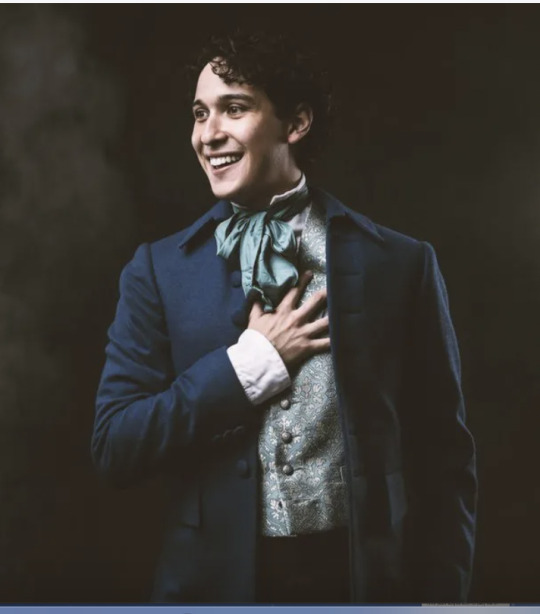
This very youthful, sweet, innocent Marius is the one whose journey most clearly revolves around growing up. A wide-eyed idealist and a cheerful dreamer, he seems to be the youngest of the students (regardless of the actor’s age) and is very much a “little brother” figure to Enjolras and his lieutenants. His love for Cosette has him almost walking on air, giddy and overwhelmed by his first romantic passion, and he makes an adorable fool of himself with his clumsy attempts to play a gallant suitor. But his innocence sometimes means painful obliviousness too, as he has no inkling that Éponine loves him. Still, it’s hard to hold it against him, because his instinctive warmth makes him treat her as a treasured friend, social class be damned. To this Marius, the world is a song, and the song is exciting… but then, at the barricade, it all goes wrong. First, he’s utterly distraught by Éponine’s death; then comes the gradual, terrible realization that the victory he thought was certain isn’t to be after all; and finally, he faces his own near-death and the brutal deaths of all his friends. This Marius reaches “Empty Chairs at Empty Tables” as a broken shadow of his former self, especially heartrending because he was once so naïve and happy. But against all odds, through his love for Cosette, he finds the strength to survive, to heal, and to ultimately be Cosette’s support and comfort after her father’s death. Thus, the boy becomes a man, and while it’s bittersweet to see him lose his innocence, it’s more than gratifying to see the stronger, wiser, and still hopeful man he becomes.
The Gentleman

This Marius might be no older in years than the Schoolboy, but he comes across as more mature. His general demeanor is calm, serious, intelligent, and characterized by gentle dignity that suits his social class. While a Schoolboy Marius’s favorite books are most likely Romantic novels and poetry, this Marius probably prefers to study philosophy and politics, and he probably has little or no thought of love until Cosette upends his world. Even then, while his romantic passion is powerfully felt, he expresses it in a gentle, reserved way, and while his awkwardness in “A Heart Full of Love” might earn a few chuckles, it never becomes broad comedy. While he’s fond of Éponine, he’s slightly more aloof from her than other Marii, with awkwardness and/or mild exasperation at her teasing. Nor is he fully blind to her attraction to him; he tries to politely evade it. After her death, he doesn’t weep inconsolably the way a Schoolboy Marius usually does, but just sits in silent, sad thought. His calm temperament shows in battle too, as he typically joins Enjolras and Combeferre in stopping the others from shooting Javert, and later gently tries to reason Enjolras into letting him go to collect bullets. None of this means he lacks emotion, however. His ardor for Cosette, his utter anguish at his friends’ deaths, and his ultimate healing through love are all very clear and moving. But they come from a character who’s arguably more believable as a 19th century bourgeois student than other musical Marii are, and whose air of dignity and thoughtfulness make him likable in a unique way.
The Revolutionary

This is the “manliest” Marius. He’s a self-assured, strong-willed young man, passionately dedicated to socio-political justice. This Marius, more than any other, is usually portrayed as Enjolras’s best friend: he relates to him as a kindred spirit, not just as a leader to follow, and is constantly by his side at the barricade. Cosette turns his world upside-down even more than she does for other Marii, because he never dreamed that something other than his friends and their cause could matter so much. But the passion and vigor he shows in battle applies to his romantic love as well, as he eagerly proclaims it for all to hear, and most likely punches Montparnasse to the ground in Cosette’s defense during “The Robbery.” Still, it’s no surprise that he ultimately chooses to join his friends on the barricade rather than follow Cosette across the sea. Since both friendship and justice for the poor mean the world to this Marius, we can expect him to be warm and kind to Éponine, and though he’ll likely hold back his tears at her death, his grief will still be deeply felt. Yet his fiery temperament also makes him more likely to quarrel with his friends than other Marii: his short debate with Enjolras about going to collect bullets may threaten to become a full-blown fight. His “Empty Chairs at Empty Tables" will also be angry as well as despairing, and we’ll wonder how he can live when everyone and everything he lived for is gone. But of course, love gives him a new “cause”: protecting, comforting, and building a new life with Cosette. With her by his side, the flames of hope and courage will always survive in this young soldier’s heart.
More comparisons are coming soon!
#les mis#les miserables#musical#characters#comparison#characterization#marius pontmercy#tw: death#tw: violence
121 notes
·
View notes
Text
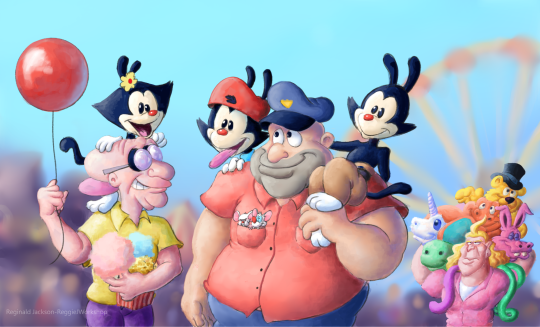
"Warner Crew At The Carnival"
Dr Scratchensniff thought he knew what to expect when he along with Ralph took the Warners out to the local carnival. Helping the Warners win Pinky and the Brain at a shady ring toss game was not one of those expectations.
The two lab mice had previously undertaken another one of their world domination schemes when one of the local carnies had mistaken them as take home pet prizes.
What followed would be an intense competion between the Warner Crew and another visitor from the reboot, body builder and new special freind, Nils Niedhardt. Two Hundred rings and several stuffed animal plushies later, the lab mice rode away safely in the shirt pocket of Ralph the secuirty guard.
Ralph giggled as the mice wiggled inside. "Theys tickle me!"
"Gee, Brain. Who knew we'd finally get a free ride for once? Narf!" said Pinky.
"This isn't the kind of free ride I had in mind." Brain complained. "In fact I finds it's hygiene questionable. Why does he smell like coconut...?"
Ralph was also carrying two of the Warner Brothers in his arms.
"Look at it this way, he's a ride you don't have to wait on for once!" Yakko responded.
"Thanks for helping out with that last game, Scratchy! We were started to get tired" Wakko said as he reached for the cotton candy in Dr. Scratchensniff's arms.
The psychiatrist looked up in shock. "You kids are actually tired? For once?!"
The two adults were suprised at how well behaved the Warners were today compared to how they usually acted in the past. Normally it ended with the both of them chasing the trio all around the carnival, several vistors being at the mercy of their 'special freind' antics and moderate property damage, but today was relatively normal for them.
Aside from the ring toss, there were only a few other incidents. Dot and Yakko tightrope walking across the beams of the moving ferris wheel. A pie eating competition that ended with Wakko in the first place and Ralph with a face full of coconut cream. And Scratchensniff nearly losing his lunch when the trio took control of a rickety spinning tea cup ride.
Dot, who was resting on his shoulder peered near his ear to respond. "We've been tired, our youthful demeanor just hides it well."
"Besides, now that our show is done, we finally have a moment to relax for once!" said Wakko. "Being zany to the max was starting to feel like work again"
Scratchensniff nodded in agreement. "Well, you three have been natural at this for years."
The trio had been ramping up their antics for the reboot's abrupt final season. But the extra pressure of pleasing their eager fans made them work harder than ever before.
"Yep. But we're cartoon veterans now. We need some time off " Yakko responded.
"Dahhh, Veterans? I didn't know theys brought back the draft!" Said Ralph.
"So what do you all have planned now the shows over?" Scratchensniff asked them.
"Catch up with all the HBO Max shows that haven't been taken off, yet." Said Yakko.
"Update my Master class on nunchuck lessons." said Dot.
"Maybe visit Slappy Squirrel, or our old CEO" Wakko added.
His older brother shook his head. "I don't about that, T.P is probably still comatose when he found out Ralph became CEO at the end of season 2"
The guard huffed indignantly. "Noes he wasn't! He was just personified with joy!"
Scratchensniff was about to correct the guards words usage when Yakko asked him. " What about you?"
Scratchensniff blinked at hearing that, he wasn't expecting to be asked about it. "Well, doing my job of course. That and looking out for you three, Which also my job"
"Wow, we thought you would retire the moment the show ended!" Wakko exclaimed.
The psychiatrist smiled. "This world is cuckoo enough as is, but if I am going to deal with it, I'd rather it be with you"
The trio smiled at his geneniunely sweet response.
Yakko looked over his shoulder. "How are you holding up back there Nils?"
The muscular overgrown adversary in question was carrying the group's victory spoils from the ring toss game.
"Hating this..." Nils grumbled. The stuffed animal plushies towered above his head.
After being such a great sport during their competition. The Warners let him pick out one to keep for himself. He ended up picking one that visually matched how he felt, a pink jackass.
I seriously had to force myself to keep this story from going on too long.
I had been meaning to do another digital painting for a long time.
But I wanted to go for a look that was more refined than my other ones. Something a little less sketchy and rough.
And with the shows final season out now, I finally felt motivated to do it with an idea I had been sitting on for a long time. The final season of Animaniacs actually ended up being really enjoyable and ended with a bang! ( Granted not the one the fans nor I were expecting)
So I decided to do a group shot with Warners and freinds again, but this time in a fluffy casual setting.
#animaniacs#animaniacs 2020#animaniacs fanart#cartoon#deviantart#yakko warner#yakko wakko and dot#wakko warner#dot warner#ralph the guard#pinky and the brain#dr scratchansniff#nils niedhardt#fanart#group shot#carnival#warner bros animation#warner siblings#digital painting#illustration
89 notes
·
View notes
Note
Ask game!
Which actors/actresses would you headcast as your (games/books) blorbos? I know about Emhyr, so maybe Morvran and Sarah?

Ehem... EEEEEEEEEEEEEEEEEEEEEeeeeeeeeeeeeeeeeeeeeeeeee
Sorry! Thanks @bittersweetbark for sending me an ask. I do have my fan cast for Emhyr, Morvran and Sarah! I will include images @alphagravy gave me.
For Emhyr, the handsome Lee Pace. Not a stretch. He already played an emperor.
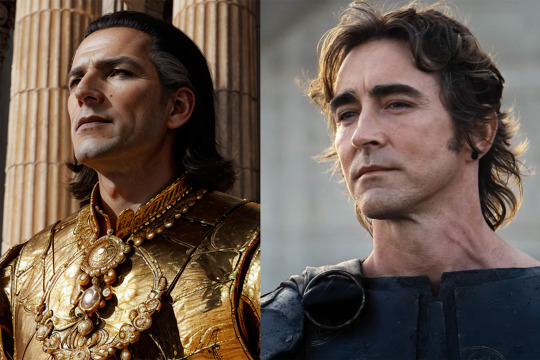
For Morvran Voorhis, I cannot think of anyone else beside his voice actor Geoffrey Breton. I mean, he already has the accent! Just give him the hair and that bored look!
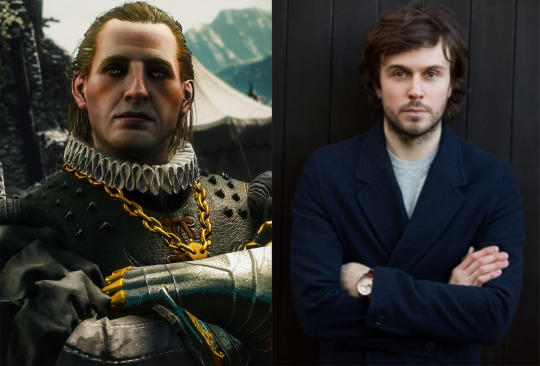
And my OC Sarah, I believe Jennifer Connelly already personified her when she was in the movie The Rocketeer. Give Jennifer a youth potion and we have Sarah!
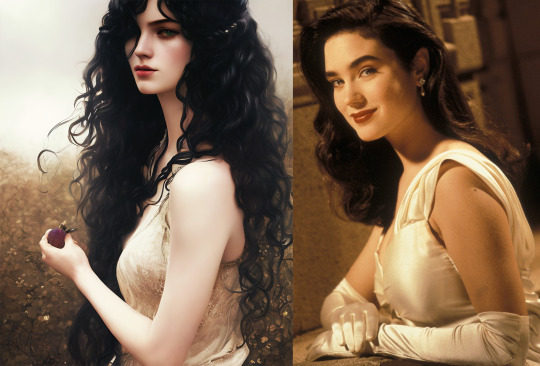
Hope you like my choices!
#tag game#my answer#emhyr var emreis#morvran voorhis#fan cast#lee pace#geoffrey breton#witcher oc#tigerlyla's oc
20 notes
·
View notes
Text
Tarot Pairs Tag
tagged by @inafieldofdaisies, @josephseedismyfather, @aceghosts, & @simplegenius042 to do this uquiz, thank you lovelies <3
Our Sins Make You Mine (Micah x John)
the devil + the emperor there's only one religion for the two of you, and that religion is the other. you two are very nearly unhealthily obsessed with one another, and that's just how you like it. when they touch you, they can feel the blood pumping under the surface of your skin. your hearts beat for one another. when the day comes that one stops, the other will soon after. until then, you both will live out your lives in perfect, gothy paradise
obsession, devotion, blood, and religion of one another, yeah this should come as no surprise to anyone. micah and john are completely obsessed with each other, and no matter how much they protest, they like it that way. they were made for each other; when micah first entered his life, john unwittingly molded her into his perfect mate. and when they parted, she grew to match him even more than he could've imagined. their reuniting is when they each finally realize that they were always one another's home. (they're only gothy in the sense that they're like morticia and gomez, only more unhinged)
Wolves Can't Tame Snakes (Lilith x Jacob)
ace of cups + ten of cups your romance is the love story that seems only possible in movies. it starts from a youthful first meeting, innocent. and from what may seem like a lifetime later, you both end up happily in union, perhaps even married! your coupling is the epitome of emotional fulfillment and devotion. neither of you thought you'd end up here, but damn if you aren't glad you did
from jacob's perspective, it was an innocent first meeting. in reality, she was coated in the blood of the man she'd just killed and was still sitting over, so. they're married long before either of them is happy about it (thanks joe), but they do eventually learn to appreciate and respect and even feel a kind of devotion. jacob gets there a lot sooner than lilith, though. their relationship is definitely a shock to both of them, but they do wind up happy in it, despite their best efforts
A Bartender and her Vicar (Lore x Max)
the tower + the lovers meeting this person shook your whole world. crumbling down is everything you thought you knew about life and love. their warmth, their generosity, their naivete, their knowing...! you don't know how anything made sense before them. all you know is that nothing will make sense afterwards
oh boy, yes. lore stomped into that mission and both their worlds collided in violent, unmistakable, irrevocable sparks. they challenged each other and changed each other to their very cores. she traversed space and time to find him, unknowingly. fate had a hand in them, but in the end it was their desire to choose each other that created the bonds that saw them through. their worlds collided and became one, like the creation of planets
But She Was Mine First (Lilith x [Redacted])
the two of cups + the star your romance is a wish granted. finally, finally, they're here. finally, *it's* here! the time where you don't have to feel lonely anymore - you'll never feel that way ever again. laughter, joy, sweetness, kisses - be at ease. all of these are things you have found someone to share with. your love is a dreamy fantasy of love and devotion and miracles. at first, your chest gets too tight when they're around - until they become as natural as the air in your lungs
these two are young love personified, so most of this is fitting, except for the 'finally' part. they're everything that is soft, sweet, innocent, puppy love. until she ruins it and lives to regret it. life has some surprises coming for them, though
Fuck Around Burn It All Down (Micah x [Redacted])
knight of pentacles + the magician if there's something you want, you will GET IT. nothing escapes your fingertips. after all, you're the power couple. your pairing sparks pure cosmic energy. you're fiercely driven to your goals - whether that be status, fortune, or power. you're also fiercely protective of one another. with the knight's earthy energy, you both prefer to purposefully make your way towards your ambitions, rather than playing cards too early or acting too loosely. meanwhile, the magician's half makes gives you a little fire. if they get too close, onlookers and threats to your relationship may get burned
oh hot diggity DAMN does this fit. every word is exactly on the money. they are definitely a powerhouse power couple. but don't expect anyone else to benefit from it
passing no pressure tags along to: @direwombat, @legally-a-bastard, @thisisrigged4, @adelaidedrubman, @henbased, @roofgeese, @florbelles, @harmonyowl, @chazz-anova, @socially-awkward-skeleton, @shallow-gravy, @jillvalentinesday, @cassietrn, @poisonedtruth, @marivenah, @voidika, @unholymilf, @confidentandgood, @v0idbuggy, @theelderhazelnut, @wrathfulrook, @trench-rot, @dumbassdep, @incognito-insomniac, @gayafsatan, @strafethesesinners, @turbo-virgins, @vampireninjabunnies-blog, @asexual-wizard, @g0dspeeed, @euryalex, @mars-colony, @damejudyhench @eclecticwildflowers, @redreart, @derelictheretic, @fourlittleseedlings, @clonesupport, @the-lastcall, @mediocre-life-span, @beemot, @silver-horse, @glitchinginthegarden, and YOU, please feel free to tag me <3
#thank you for tagging me <3#micah hale#lilith mallory#lore jameson#ship: our sins make you mine#ship: wolves can't tame snakes#ship: a bartender and her vicar#ship: but she was mine first#ship: fuck around burn it all down
41 notes
·
View notes
Text
Commenting on the the magnus archives episodes, part 3 (I think) - spoilers ahead
MAG 16 Arachnophobia: I was fully prepared for that episode to destroy me, I can't stand spiders, but now I feel like it could have been worse, at least it was only one spider at a time, my nightmares are filled with a bunch of spiders... which I guess he got at the end, but that wasn't described in great detail, so I was okay. Apropos the end: I was a bit confused because I read this episode was the most obviously paranormal one, and honestly, thinking the spiders from your youth are haunting you isn't so much paranormal, I thought episode 15 with her beeing found with candles she didn't pack was worse, but then I got to the end, and him beeing found incased in Web... uah. And come on John, you wanna try to reason that they came from one week of lying there?! Ugh
MAG 17, the Bone Turner's Tale: immediately after the first few sentences I was like: oh no, this is a Leitner one, isn't it? And sure enough it was... I don't even know what else to say to this except type out the Leitner Rant, but that is a lot of text, and this post will already be very long. At least John is a bit more inclined to believe the tale when there is Leitner involved.
MAG 18 The Man upstairs: I needed a bit more time for that episode because I have a very active imagination and got nauseous towards the end...
MAG 19 Confession | & MAG 20 Desecrated Host || : love the connection to the hilltop Road episode. Also, did somebody say religious trauma? Because these episodes screamed in answer. The beginning of 19 was... worrying to say the least - "We will get to the cannibalism of course" ehm, hold on, what? On another note, these episodes made me suspect that John's predecessor realy had a sorting system because that was at least the third episode in a row with the flesh entitie! While I honestly was just waiting for the first appearance of the Vast...
MAG 21 Freefall: finally, the Vast, I don't know what exactly sparked my obsession with it, but I like this entitie (as much as you can like a fear personified) since I first saw a art-tiktok about it weeks ago. Nothing much to say to this episode tho, except that John got sceptic again, he had such a good run of taking things seriously before.
Ending the Episode with the quote "By God Martin, what are these things?!" Was a choice...
MAG 22 Colony: Did I ever mention before that I love Martin? Well, I do, and now that he actually speaks for himself once, I feel even more justified in saying that.
Two options here "poor Martin, just wanted to show a picture to his (future) boyfriend" or "King wanted to stick it to his asshole Boss" I'm in the party of both. Both is good.
Also, after this episode the following post I found on Pinterest suddenly makes a lot more sense
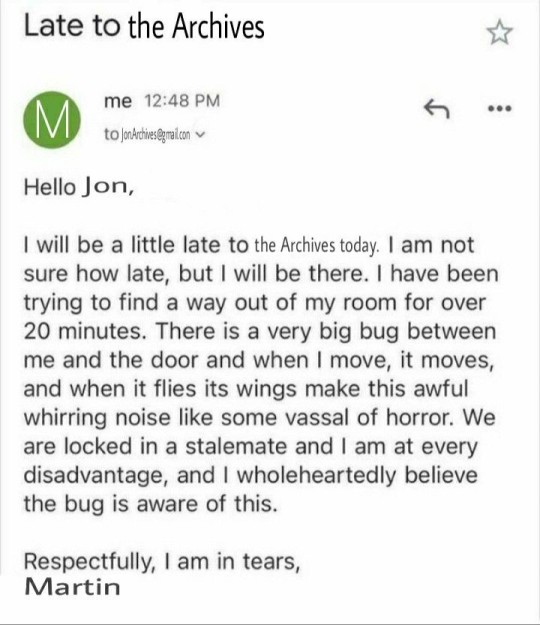
I also asked myself how much the entities blurr together, because, while this was mainly corruption, there was also darkness because the lights didn't work in Martins flat, right?
I was so happy when John showed that he cared for Martin, in telling him to life in the institute for now :)
The creepy text messages at the end sparked a conversation between me and @regulus-needs-swimminglessons and I wanted to share one of his comments to that:
These text are so funny because there are basically 2 options
1 (the boring one) Jon and Martin don't text a lot so Jon doesn't actually know what Martin's texting style is like so Jane was able to impersonate him easily
2 (the better option) Jane was looking through the past texts giggling and kicking her feet while reading funny passages out loud for her worm friends so she could copy his texting style but she had to hold back to not end every message with "❤️❤️❤️❤️❤️🥰🥰😍😘😘😘😘😘😘❤️❤️❤️😘😘😘😘🪱🪱🪱🪱🪱😘😘🥰🥰❤️"
MAG 24 Schwarzwald: at first I was convinced that the headline was read by someone else than John, because it sounded weird to me. Then I got reminded that German words, like Schwarzwald, just get pronounced weirdly by englishspeakers, which is totally normal, so back to the story. An old letter to Jonah Magnus, did Elias read these 👀. The comment that there was no account of a Johann von Württemberg confused me, because Johann is/was a fairly common german name, especially in the higher up families. And there was in fact a Johann Friedrich von Württemberg who lived from 1582 to 1628, but that's not the one reported here, I would guess. He ruled as the 7th Duke at that time. Anyway, the Grave gave me slight Lukas-Family vibes, even tho I know that not the case, the involved entitie here is the Eye not the Lonely (even tho it kind of screams the lonely to me too, I mean, it's the Schwarzwald, and he described it as silent on lonely, but oh well)
Martin, scaring John by walking though the archive without pants. 🤣
Sir that is his living room and he can wear whatever he wants 😌 Martin can do whatever he wants, wherever he wants, just because he's awesome, and I love him.
MAG 24 Strange Music: I don't like dolls, I don't like clowns, and that's all I'm gonna say to that... But there is finally an appearance from sasha, which is awesome ^^ And again, something incredible: John is inclined to believe a Statement woob woob
MAG 25 Growing Dark: I mentioned religious trauma before, and I will mention it again, because this is exactly that. A bit frustrating to go back to "mh, we don't believe this because the author isn't even believing himself"
MAG 16 Distortion: Michael! My Dude! Be a dear and miracle me a towel, would you? Oh whops, wrong fandom, wrong quote... anyway, hello Michael, and hello Sasha. Its a bit sad to hear every archival assistant tell in their statement that they feared to come forward because John would judge them... But Sasha is hurt, and the "most level headed" so of course he believes her. Also, she's a little heroine, because she went to that place only to save John (and Martin, and the Archive, but oh well) first time that not beeing able/wanting to quit got mentioned, intrigued for the future.
MAG 27 A sturdy Lock: Everything involving the spiral always confuses me. I feel sorry for the old man, and am very interested what the statement from his Son is gonna be. But what do you meant the door had no knob or keyhole at the end?!
That's all for now, I'm currently listening to MAG 28 Skintight, but that will be in my next post I assume. So good bye, I hope you had fun with my incoherent rambling. (And again: please excuse my grammar, English is not my first language)
Okay byyyyeeee
#the magnus archives#arachnophobia#the bone turner's tale#the boneturner#the man upstairs#confession#desecrated host#freefall#the vast#the spiral#the buried#the flesh#the corruption#colony#schwarzwald#Distortion#michael distortion#a sturdy lock#tma#johnathan sims#martin blackwood#sasha james#MAG 16 to 27#good omens
19 notes
·
View notes
Text
The Haunting of Hill House
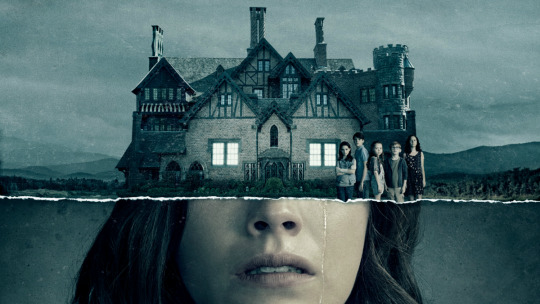
In “We’re Going to Make You into a Proper Woman: Postfeminist Gender Performativity and the Supernatural in Penny Dreadful,” Pedro analyzes two female protagonists in relation to their supernatural abilities, or "uncanny doubles," a term used to personify the socially deviant side of one's identity--ones 'otherness.' Pedro critiques the lack of liberation for these women, whose tragic endings frame their 'social deviance' as not only failed, but as worthy of punishment. The show thus reinforces gender norms despite its focus on female perspectives. The Haunting of Hill House similarly explores “uncanny doubles,” which take the form of supernatural spirits that haunt Olivia and Nell Crain (mother and daughter). The show surrounds the Crain family reunion (4 siblings and 1 father), as they gather for Nell's funeral. We soon learn of the family’s complications, all of which are tied to their summer at Hill House (~30 years ago), where Olivia (wife & mother) was driven to hysteria and committed suicide. I focus on Episode 5, as Nell’s perspective is shown through flashbacks, and the supernatural forces behind her death are revealed.
1. How does the series form and content inform the relationship of female physical and emotional growth and development?
The show’s form as a gothic horror enables a fictitious and creative exploration of loss, grief, & trauma's effect on female growth. Nell’s trauma takes the form of the Bent Neck Lady, a spirit whose random appearances cause paralysis and constant fear. This hinders Nell's development, resulting in her social withdrawal. Flashbacks reveal the spirit emerged at Hill House, creating a tie between the trauma experienced there, the Bent Neck Lady and Nell’s resulting development. While Nell temporarily finds a loving partner and shows positive growth (confronting her emotional trauma and fighting her physical paralysis), his death both halts and reverses her positive development, as her childhood grief resurfaces. At his death, the Bent Neck Lady stands next to his dead body, and visually marks the parallel between this loss and that of her mother. This marks the beginning of Nell's end, as she becomes emotionally weak and returns to Hill House. Her final development occurs at death, when she falls through time and realizes that she has just become--and has always been--the Bent Neck Lady. The series illustrates the role of loss in female development through Nell's final transformation into the Bent Neck Lady, aka, her trauma; trauma defines her--she has internalized her loss, and we watch grief literally consume her from the inside out.
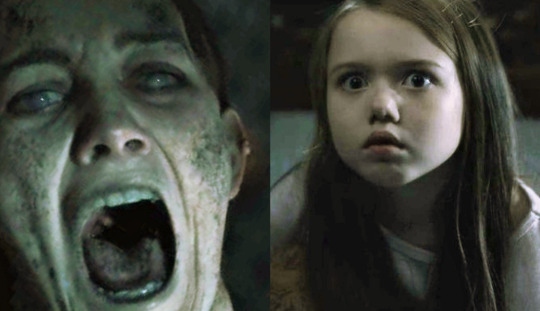
Arthur's Death
2. In what ways does the series use cinematic timing to chronicle character transformations?
The show provides information surrounding the Cain family members’ individual character transformations through its editing style, in which flashbacks to 1) ~30 years ago at Hill house and 2) the recent past–prior to Nell’s death, are interspersed throughout the present (Nell’s funeral). Each episode focuses on one character’s perspective, and reveals their individual childhood experiences at Hill House in relation to their current adult lives. Luke, Nell’s twin brother and the second most affected of the Cain children, exemplifies a stark transformation through two back-to-back scenes. We flashback to childhood, and see him as a strong, self-sufficient boy who takes care of Nell–he teaches her a counting method to use as a distraction from the Bent Neck Lady. This is contrasted by a switch to the recent past, in which Luke–an addict a dirty, scratched face–walks the streets alone. The Tall Man—a spirit that emerged at Hill House—floats behind him. He uses the counting method he previously taught Nell, now attempting to distract himself, rather than helping her. His initial youthful fearlessness and positivity contrast with his current vulnerability and anxiety, and this transformation is heightened through the switch from the past’s bright, colorful clarity to the dark, sickly yellow tones of the present. The Tall Man’s presence and his switch to represent Olivia at the end of the scene visually highlights this transformation as directly tied to his childhood trauma and loss.
Luke's Transformation (15:55 - 17:25)
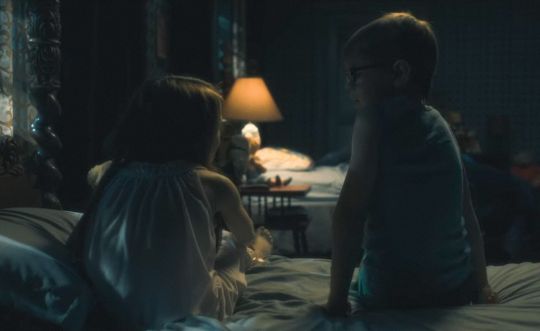

3. How are the primary characters’ ages and development coded by the characters around them?
All of the primary characters develop with age, and initially represent narratives of youthful innocence, but take a turn after their summer at Hill House. I focus on Nell, as her siblings play a particularly large role in the choices she makes, including her eventual death and final development into the Bent Neck Lady. Nell’s siblings treat her as a naive child during both childhood and adulthood, leading her to internalize feelings of “invisibility.” This invisibility follows her throughout life, as her siblings disregard her fear of the Bent Neck Lady and ideas of the supernatural, blaming them on mental illness. This treatment results in Nell feeling unheard–invisible–, and leads to feelings of worthlessness and isolation, which are framed as partially responsible for Nell’s eventual despair and return to Hill House/death.
Nell's Invisibility

4. In what ways does the series reflect narratives of youth and represent narratives of adult functionality or dysfunctionality?
The series focuses on youth as a key part of the Crain childrens’ later identities as adults, connecting their level of functionality to the varied levels of trauma they faced as children. Youth is portrayed as naive and innocent; a blank canvas to create a fully functional adult. Those touched by trauma develop into dysfunctional adults, while those less affected are more functional. The two most dysfunctional adults are Luke and Nell, who experienced the consistent appearance of evil spirits at Hill House. Steven, who experienced the least supernatural trauma, is framed as the most functional sibling, and as such, doesn’t understand the source of his family’s dysfunctionality. He blames his mother’s haunting on mental illness, and later does the same with Nell. Nell’s dysfunctionality is framed in contrast to Steven’s functionality, evident in a scene where she crashes his book signing at the height of her grief.
Nell's Breakdown

5. How does the series use the fantasy genre as an area for framing virtue and villainy?
Just as Pedro notes in the reading, the supernatural can be used to empower women, but this series fails to do so, and instead frames the two most narratively significant characters as villains. While Olivia is initially framed as a warm, loving mother, her victimization quickly leads to her villain hood. Poppy Hill, an evil spirit, feeds on Olivia’s loving emotionality, and convinces her to kill her children to save them from the “evil” of the outside world. While this plan fails, Olivia accidentally poisons a little girl in the process and is framed as hysterical. Years later, her vilification continues when Olivia's spirit fully consumes the role of her uncanny double (Poppy's spirit), orchestrating Nell’s death just as Poppy did to her.
Poppy Hill (spirit) urges Olivia to "wake her family up" from the nightmare of life--to kill them, keeping their spirits 'alive' and 'safe' in Hill House, forever.

Nell's Death (TRIGGER WARNING: Stop Before 1:35)
Nell illustrates an even clearer clash between victimhood and villain hood, as she has always been her uncanny double, the Bent Neck Lady. By framing Nell as her own villain, the narrative blames her for her own victimization, and thus punishes, rather than liberates her. While last episode allows her to reclaim virtuosity, as her dead spirit helps her trapped siblings escape from Hill House, the truly impactful act is framed as her father's sacrifice, shifting the focus to male heroism and away from Nell.
Moments before Death, Olivia blurs Nell's view of Hill House. She hallucinates beauty and the presence of her loved ones, and only wakes up when it's too late, and Olivia literally pushes her to death.
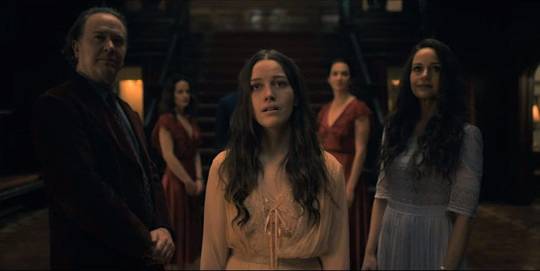
Critical Thinking Questions:
Do you think that Nell and Olivia are victims, villains, or neither?
Hill House is framed as a place where time is non-linear, which enables the characters (Nell) to interact with themselves in different time periods. How is this meaningful in relation to confronting their trauma?
In the end of the show, Hugh sacrifices himself, fully calming Olivia down and enabling his children to escape from Hill House. Do you think his heroism overshadows the horrible fates of the female protagonists?
Nell's constant anxiety is only truly resolved when she returns to Hill House, the source of her trauma. In response to this, do you view her ending as closure instead of punishment/torture?
#oxyspeculativetv @theuncannyprofessoro
15 notes
·
View notes